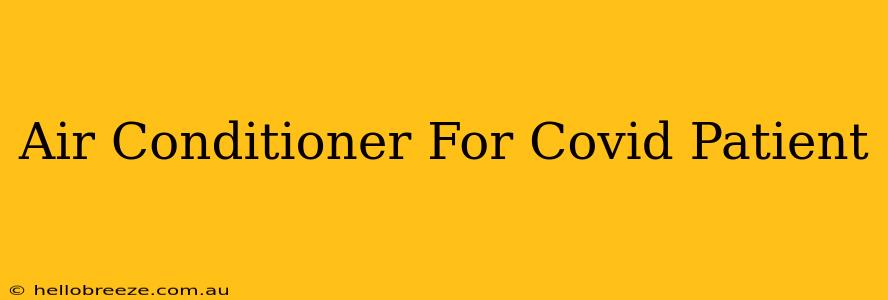The COVID-19 pandemic highlighted the importance of proper ventilation and temperature control, particularly for individuals recovering at home. While air conditioning offers crucial comfort, especially during illness, concerns remain about its potential impact on virus transmission. This guide will address these concerns, offering advice on safe and effective air conditioner use for COVID-19 patients.
Understanding the Risks and Benefits
Air conditioning, while beneficial for managing fever and discomfort, can also present potential risks if not used correctly. Poorly maintained units can harbor bacteria and mold, exacerbating respiratory issues. Furthermore, recirculated air, if not properly filtered, could potentially increase the risk of airborne transmission of the virus, although the primary transmission route remains droplets.
Benefits of Air Conditioning for COVID-19 Patients:
- Temperature Regulation: Maintaining a comfortable temperature helps reduce fever and discomfort, aiding recovery.
- Improved Breathing: Cool, dry air can ease breathing difficulties often experienced by COVID-19 patients.
- Reduced Strain on the Body: Fighting illness requires energy. Air conditioning reduces the body's need to work to regulate temperature, allowing it to focus on recovery.
Potential Risks:
- Poor Air Quality: Dirty filters can circulate dust, allergens, and potentially harmful microorganisms.
- Airborne Transmission (Low Risk): While not the primary transmission mode, recirculated air could potentially increase the risk of transmission, particularly in poorly ventilated spaces.
Safe Air Conditioner Usage Practices
To mitigate risks and maximize benefits, follow these guidelines when using an air conditioner for a COVID-19 patient:
1. Maintain Cleanliness:
- Regular Filter Changes: Change or clean air conditioner filters regularly, according to the manufacturer's recommendations. Dirty filters reduce airflow and can harbor bacteria and mold.
- Unit Cleaning: Clean the air conditioner unit itself, including coils and vents, to prevent the buildup of dust and allergens. Consult your manufacturer’s instructions. Professional cleaning may be beneficial.
2. Optimize Air Circulation:
- Proper Ventilation: Combine air conditioning with adequate ventilation. Open windows (when safe and weather permits) to allow for fresh air circulation. This dilutes potential viral particles.
- Air Purifier: Consider using a HEPA filter air purifier, which can remove airborne particles, including viruses. This should be used in addition to, not instead of, proper air conditioning maintenance.
3. Temperature and Humidity Control:
- Optimal Temperature: Maintain a comfortable temperature between 72-78°F (22-26°C). Avoid excessively cold temperatures, as this can exacerbate respiratory issues.
- Humidity Levels: Aim for a moderate humidity level. Excessive humidity can encourage mold growth. A dehumidifier may be helpful in humid climates.
4. Patient Isolation (If Necessary):
- Dedicated Room: If possible, isolate the COVID-19 patient in a separate room with their own air conditioning unit to minimize the potential for transmission to others in the household.
When to Consult a Healthcare Professional
If the COVID-19 patient experiences worsening respiratory symptoms, fever, or other concerning signs despite using an air conditioner, seek immediate medical advice. A healthcare professional can assess the situation and provide appropriate guidance.
Conclusion
Air conditioning can play a valuable role in managing the symptoms of COVID-19 and ensuring patient comfort. However, responsible use is crucial. By prioritizing cleanliness, proper ventilation, and optimal temperature and humidity levels, you can minimize potential risks and maximize the benefits of air conditioning for COVID-19 patients. Remember that this information is for guidance only and should not replace advice from a medical professional.

